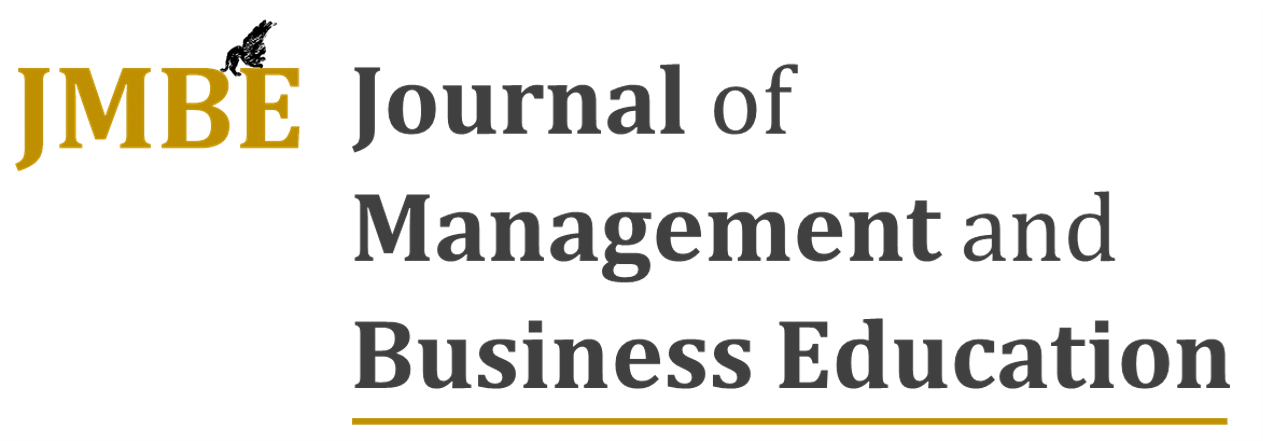The influence of self-assessment activities on student learning outcomes
DOI:
https://doi.org/10.35564/jmbe.2018.0003Abstract
In the European Higher Education Area, students assume responsibility for their own learning. Using self-assessment activities (carried out on virtual platforms), students increase their autonomy, responsibility, communication and flexibility in their learning process. This study uses a sample of 356 students during the academic year 2016/2017. The results show a positive impact between student participation in self-assessment activities and their learning outcomes. Individual and academic factors as well as attitude towards the subject influence students’ participation in self-assessment activities.
Downloads
References
Aguilar-Rivera, M.C. (2010). Estilos y estrategias de aprendizaje en jóvenes ingresantes a la universidad. Revista de Psicología, 28(2), 207-226.
https://doi.org/10.18800/psico.201002.001
Andrade, H.; & Valtcheva, A. (2009). Promoting learning and achievement through self-assessment. Theory Into Practice, 48, 12-19.
https://doi.org/10.1080/00405840802577544
Barca-Enríquez, E.; Vicente-Castro, F.; Almeida, L.; & Barca-Lozano, A. (2014). Impacto de estrategias de aprendizaje, autoeficacia y género en el rendimiento del alumnado de educación secundaria. International Journal of Developmental and Educational Psychology, 2(1), 287-298.
https://doi.org/10.17060/ijodaep.2014.n1.v2.442
Barrio, J.A. del & Nicasio-Gutiérrez, J. (2000). Diferencias en el estilo de aprendizaje. Psicothema, 12(2), 180-186.
Calero, J.; Choi, A.; & Waisgrais, S. (2009). Determinantes del rendimiento educativo del alumnado de origen nacional e inmigrante en PISA-2006. Cuadernos Económicos de ICE, 78, 281-310.
https://doi.org/10.32796/cice.2009.78.5977
Chiswick, B.R.; & Miller, P.W. (2003). The complementarity of language and other human capital: Immigrant earnings in Canada. Economics of Educational Review, 22(5), 469-480.
https://doi.org/10.1016/S0272-7757(03)00037-2
Delgado-García, A.M.; & Oliver-Cuello, R. (2009). Interacción entre la evaluación continua y la autoevaluación formativa: La potenciación del aprendizaje autónomo. Revista de Docencia Universitaria, 4, 1-13.
https://doi.org/10.4995/redu.2009.6234
Dorsey, O.L.; & Pierson, M.S.A. (1984). A descriptive study of adult learning styles in a Nontraditional education program. Lifelong Learning, 7(8), 8-11.
García-Beltrán, A.; Martínez, R.; Jaén, J.A.; & Tapia, S. (2016). La autoevaluación como actividad docente en entornos virtuales de aprendizaje/enseñanza. Revista de Educación a Distancia, 50, artículo 14, 1-11.
https://doi.org/10.6018/red/50/14
Glick, P.; & Sahn, D.E. (2010). Early academic performance, grade repetition, and school attainment in Senegal: A panel data analysis. The World Bank Economic Review, 24(1), 93-120.
https://doi.org/10.1093/wber/lhp023
Informe Ditrendia (2017). Informe mobile en España y en el mundo 2017. Available at: http://www.amic.media/media/files/file_352_1289.pdf
Irimia-Diéguez, A.I.; Di Pietro, F.; Vega-Pascual, M.; & Blanco-Oliver, A.J. (2014). El uso de las redes sociales en el marco del Espacio Europeo de Educación Superior. Educade. Revista de Educación en Contabilidad, Finanzas y Administración de Empresas, 5, 49-64.
https://doi.org/10.12795/EDUCADE.2014.i05.05
Jones-White, D.R.; Radcliffe, P.M.; Huesman, R.L.; & Kellogg, J.P. (2010). Redefining student success: Applying different multinominal regression techniques for the study of student graduation across institutions of higher education. Research in Higher Education, 51(2), 154-174.
https://doi.org/10.1007/s11162-009-9149-4
Kherfi, S. (2008). Economic education in the Middle East: Are the determinants of success in introductory economics any different? The Journal of Economic Education, 39(1), 22-40.
https://doi.org/10.3200/JECE.39.1.22-40
López-Pastor, V.M.; González-Pascual, M.; & Barba-Martín, J.J. (2006). ¿Debe el alumnado participar en la evaluación? Propuestas y experiencias en Primaria y Secundaria. Available at: http://www.concejoeducativo.org/2006/debe-el-alumnado-participar-en-la-evaluacion-propuestas-y-experiencias-en-primaria-y-secundaria/
López-Pérez, M.V.; Pérez-López, M.C.; & Rodríguez-Ariza, L. (2011). Blended learning in higher education: Students' perceptions and their relation to outcomes. Computers & Education, 56(1), 818-826.
https://doi.org/10.1016/j.compedu.2010.10.023
Marcenaro-Gutiérrez, O. D., and Navarro-Gómez, M. L. (2007). El éxito en la universidad: Una aproximación cuantílica. Revista de Economía Aplicada, 15(44), 5-39.
Martí, C. (2012). ¿Existen diferencias en el proceso de aprendizaje en función del género del estudiante? Available at: http://2012.economicsofeducation.com/user/pdfsesiones/123.pdf
Martín-García, A.V.; & Rodríguez-Conde, M.J. (2003). Estilos de aprendizaje y grupos de edad: Comparación de dos muestras de estudiantes jóvenes y mayores. Aula Abierta, 82, 97-116.
Padilla-Muñoz, E.M. (2002). Expectativas sobre la eficacia del role-playing como estrategia de enseñanza-aprendizaje y su influencia en el rendimiento académico. Revista de Enseñanza Universitaria, 19, 149-163.
Ríos-Muñoz, D.; & Troncoso, P. (2003). Autoevaluación de los alumnos: Una estrategia participativa orientada al "aprender a valorar". Revista de Estudios y Experiencias en Educación, 2(4), 111-120.
Sharma, R.; Jain, A.; Gupta, N.; Garg, S.; Batta, M.; & Dhir, S.K. (2016). Impact of self-assessment by students on their learning. International Journal of Applied Basic Medical Research, 6(3), 226-229.
https://doi.org/10.4103/2229-516X.186961
Sung, Y.T.; Chang, K.E.; Chiou, S.K.; & Hou, H.T. (2005). The design and application of a web-based self- and peer-assessment system. Computers & Education, 45, 187-202.
https://doi.org/10.1016/j.compedu.2004.07.002
Valentín, A.; Mateos, P.M.; González-Tablas, M.M.; Pérez, L.; López, E.; & García, I. (2013). Motivation and learning strategies in the use of ICTs among university students. Computers & Education, 61, 52-58.
Downloads
Published
How to Cite
Issue
Section
License
Copyright (c) 2023 Journal of Management and Business Education

This work is licensed under a Creative Commons Attribution-NonCommercial-ShareAlike 4.0 International License.
License terms at: https://creativecommons.org/licenses/by-nc/4.0/legalcode




